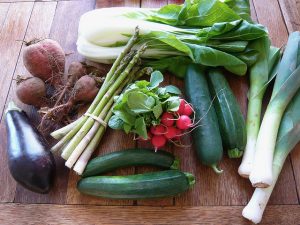Healthy Eating Habits: Saving Money On Organic Food
 Though the demand for organic food is increasing, grocery store prices on organic items are still higher than their non-organic counterparts.
Though the demand for organic food is increasing, grocery store prices on organic items are still higher than their non-organic counterparts.
Still, by shopping smart, we can eat an organically-based diet without breaking the bank.
If switching to organic foods seems daunting, start small. Begin by stocking up on a few cans of organic legumes (beans) or purchase one organic fruit and veggie each week, until you feel ready to shop for more.
These money-saving tips may also help you go organic.
Saving Money On Organic Foods: Six Tips
- Some organic foods are offered under less expensive store brand labels. Two well known store brands selling organic products are Trader Joe’s and Whole Foods. More stores are starting to do this because of increased demand for organics. Look for store brand organic items where you shop.
- Organic foods and earth-friendly household products can often be purchased in bulk at warehouse clubs. Paper products, cleaning, and laundry supplies, canned or bottled food staples (e.g., olive oil, legumes) are more affordable when you stock up.
- Many grocery stores have a reward or bonus card program. Subscribers provide the store with data about consumer trends and are rewarded with discounts on a variety of items, including organic foods and products.
- The best way to guarantee food is organic is to grow it yourself. You can start small with one tomato plant or grow two or three veggies in a small backyard patch. Many vegetables and herbs grow well in containers making porch and patio gardening an option. Or, grow a few herbs indoors—several varieties thrive in sunny south facing windows.
- You can enjoy an organic-based diet without buying all your produce in the organic aisle. If you peel a food to get at its fruit – such as oranges, bananas, or avocados – you can stretch your grocery dollar by purchasing them from non-organic bins.
- Buy organic foods for less by shopping at farmer’s markets, at stores that carry locally grown produce, or join a community-supported agriculture delivery service, often called a CSA (check out localharvest.org/csa). Purchasing locally also supports your community’s economy.
Sources: Gaiam Life; U.S. News
Photo credit: LINK WORDS
 Eating Disorder Self Test. Take the EAT-26 self test to see if you might have eating disorder symptoms that might require professional evaluation. All answers are confidential.
Eating Disorder Self Test. Take the EAT-26 self test to see if you might have eating disorder symptoms that might require professional evaluation. All answers are confidential.